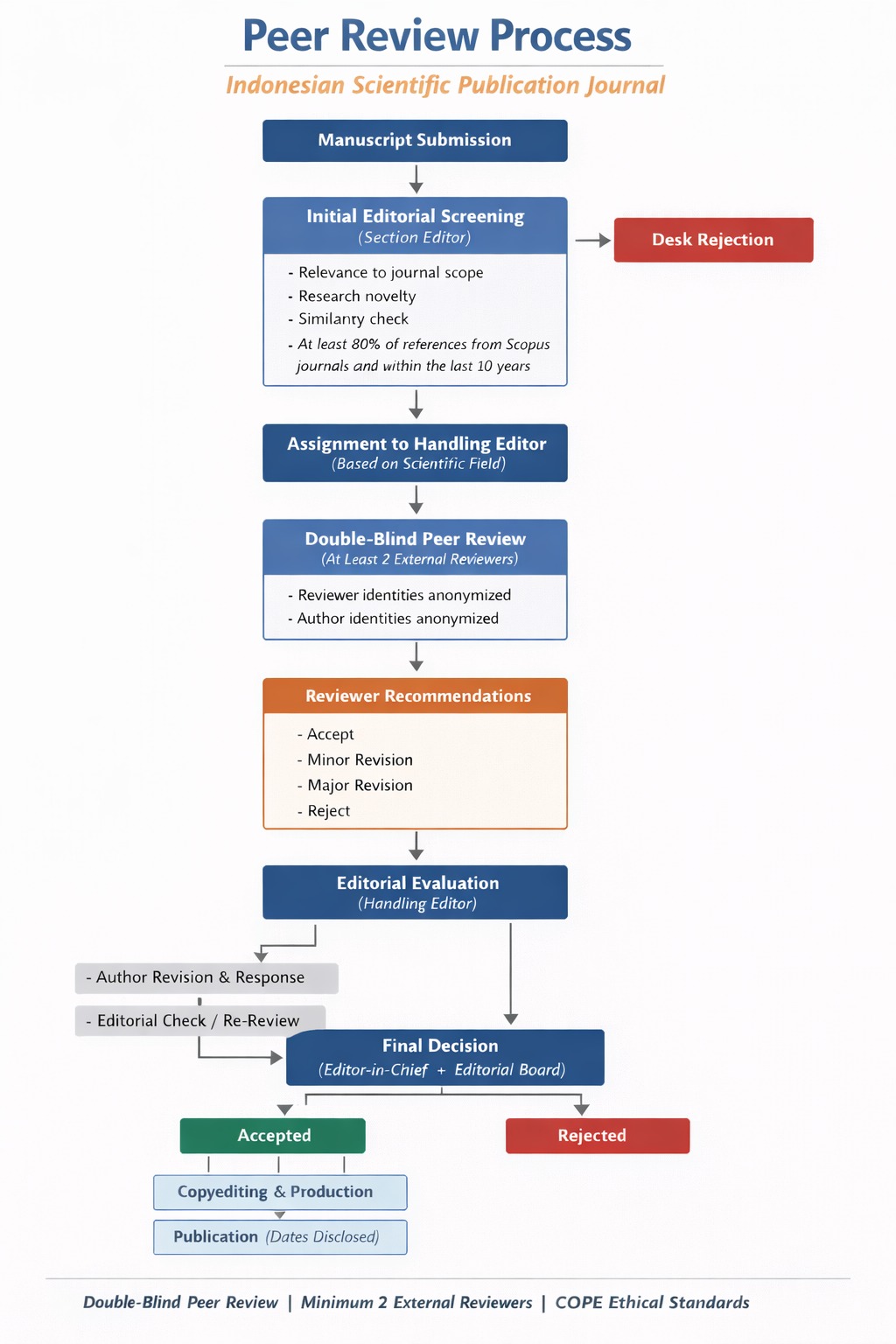Peer Review Process

Peer-Review Process
Logistica: Journal of Logistics and Transportation follows a rigorous and transparent review process to ensure the quality and credibility of the published articles. The journal adopts a double-blind (double-anonymous) peer-review type, where the identities of both the authors and reviewers are kept anonymous during the review process.
Submission and Initial Evaluation
All manuscripts submitted to Logistica undergo an initial evaluation by the editorial team to assess their suitability and compliance with the journal's scope and guidelines. Manuscripts that pass the initial evaluation are assigned a unique identification number for further processing. The Editor-in-Chief screens the manuscripts for alignment with the journal's focus and scope and assigns a subject-specific handling editor.
Peer Review
Each eligible manuscript is then sent for review to a minimum of two independent expert reviewers in the relevant field. Reviewers are carefully selected based on their expertise, experience, and publication history in logistics and transportation. Potential conflicts of interest are avoided to maintain impartiality. In cases of significantly divergent reviews, a third reviewer may be consulted.
Double-Blind Review
Logistica ensures a double-blind (double-anonymous) peer-review process, where the identities of both the authors and reviewers are concealed from each other. Reviewers receive anonymized manuscripts, and authors receive anonymized feedback to ensure fairness and objectivity in the evaluation process.
Review Criteria
Reviewers assess submitted manuscripts based on:
- Originality and significance of the research.
- Methodological rigor and appropriateness.
- Clarity of presentation and writing quality.
- Adherence to ethical standards in research and reporting.
- Relevance to the journal's scope and readership.
Constructive feedback and suggestions for improvement are encouraged to assist authors in enhancing the quality of their work.
Review Duration
Logistica strives to provide timely and efficient peer review. Reviewers are typically given 3-4 weeks to complete their evaluations, with reminders sent to ensure adherence to the timeline. Authors will be informed of the estimated duration of the review process during submission or after revisions.
Decision and Revision
Upon completion of the peer-review process, the handling editor synthesizes the reviewers' feedback and recommendations. Possible outcomes include:
- Acceptance.
- Minor or major revisions.
- Reject and resubmit.
- Rejection.
For manuscripts requiring revisions, authors are given 3-4 weeks for minor revisions and 6-8 weeks for major revisions. Revised manuscripts are re-evaluated by the handling editor and, when necessary, the original reviewers. If further revisions are required, the process may be repeated until the manuscript meets the journal's standards.
Editorial Decision
The final decision regarding the publication of a manuscript rests with the Editor-in-Chief, based on the handling editor's recommendation. Decisions are communicated to authors through detailed letters, including anonymized reviewer comments.
Post-Acceptance
Accepted manuscripts undergo copyediting and typesetting to ensure accuracy and consistency. Authors are provided with proofs for review before final publication.
Confidentiality
Logistica maintains strict confidentiality throughout the peer-review process. Reviewers are required to treat manuscripts and their contents as confidential documents and must not disclose any information to unauthorized individuals.
Continuous Improvement
Logistica: Journal of Logistics and Transportation continuously evaluates and refines its peer-review process. Feedback from authors, reviewers, and editors is invaluable in ensuring the system remains efficient, fair, and transparent.
Contact
For any inquiries or questions related to the review process, please contact the editorial team at [email protected]



